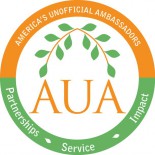America's Unofficial Ambassadors
We work at the grassroots level throughout the Muslim World to counter violent extremism before it takes hold, to promote tolerance and understanding, and to foster better relations with the United States.
A Bottle of Hope
The following is a post from AUA Mosaic Fellowship recipient Anina Tweed. Anina is currently volunteering in Bangladesh during the summer of 2012. To find an amazing volunteer opportunity, search the AUA Directory of Recommended Organizations© today.
“I feel like I carry with me a bottle of hope that is being continually filled by the power, voice and support of my fellow sisters” – WPSP Fellow
Our year of service has begun with attending the State Department’s Women in Public Service Institute at AUW. The WPS Project aims to “build a generation of women leaders who will invest in their countries and communities, provide leadership in their governments, and change the way global solutions are forged.” For a week now, international human rights expert Dr. Ra ngita de Silva has been leading 43 women from Afghanistan, Pakistan, India, Bangladesh, and Vietnam in workshops covering issues from norms in international domestic violence lawmaking to the importance of encouraging men to act as caregivers in the family.
ngita de Silva has been leading 43 women from Afghanistan, Pakistan, India, Bangladesh, and Vietnam in workshops covering issues from norms in international domestic violence lawmaking to the importance of encouraging men to act as caregivers in the family.
Throughout the institute, the fellows have proven themselves to be critical thinkers and relentlessly inquisitive. They confront their guest lecturers with critical, difficult questions even the most senior development workers and advocates struggle with. Just today, two of the girls asked a leading law enforcement official what should be done in cases where the police themselves are the perpetrators of violence against women. Others expressed concern over how domestic violence programs could be accessed by poorer women living in more remote, rural regions. Unfortunately, for most of these questions, even lawyers, doctors and police chiefs have no clear answer. When not listening to guest presenters, the fellows engage in role playing scenarios and brainstorming sessions to strategize their own policies. Their presentations on sexual harassment, anti-corruption, child marriage, and educational reform give me hope that this generation of women will find ways to answer their own questions and pose their own solutions where others have failed.
The most moving part of the institute has been the focus on the power of women’s narratives. Each one of these women has a story to tell, and Dr. de Silva has encouraged them to hone their public speaking skills in order to become effective leaders. The fellows have risen to the challenge, sharing with us personal hardships. They’ve not only revealed the biases they’ve overcome and stereotypes they’ve shattered, but have gone farther to derive from these struggles the dreams and goals they will now work towards. Above all, they approach their stories with a sense of humor, humility, and passion that resonates in their words. Throughout their narratives, themes such as the centrality of education, the hardships of being born a girl, and the struggle to overcome stereotypes are woven. They make themselves vulnerable when admitting “Since I was born, my existence as a girl has been denied”, “to be an Afghan was a humiliation”, and “I was born into a family expecting a boy.” Yet in the same breath they prove their strength and resolve as they are determined to use their skills to become change makers.
Though these women may be interested in diverse areas of change, from environmental advocacy, to the technology sector, to child’s rights, they all acknowledge the strength they derive from each other. Overall, the WPS project emphasizes the importance of forming women’s networks in order to empower and build partnerships for change. These fellows embody that spirit. One stated: “we come from different countries but we have a common pain.” For most, the pain of being discriminated against based on their gender is quickly turning into a sense of power, resolve and partnership. While they may have felt “abnormal” and out of place in their home communities, they see their own passions reflected in each other and garner strength. We World Teach fellows in turn feel our bottles of hope overflowing for the year to come…

Pingback: US Youth Ambassadors Connect with Muslim World (Voice of America) | Creative Learning